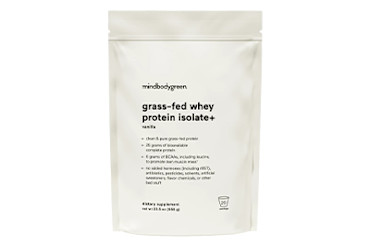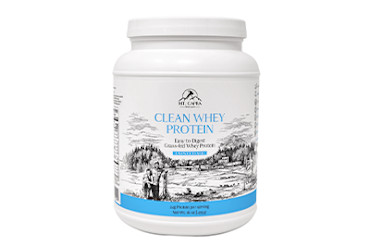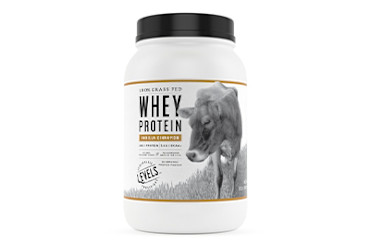Depending on your daily protein goals, hitting your target with eggs, yogurt, and even chicken or beef can be a challenge. Whey protein powders make it easier to sneak extra protein into your meals and snacks without much effort.
The key is finding one that tastes good, agrees with your stomach, and packs a meaningful dose of muscle-supporting amino acids.
We did the heavy lifting (no pun intended) to find the five best whey protein powders of the year for muscle growth.
Health benefits of whey protein powder
The official Recommended Dietary Allowance1 for protein is 0.8 grams per kilogram of body weight per day, but this is the bare minimum amount you need to avoid a protein deficiency. Many experts suggest getting closer to 1.2 to 2.0 grams per kilogram a day in order to optimize your health, not just avoid health concerns.
Your specific protein requirements will vary based on factors like your age, weight, and activity level, but most people will want to eat upwards of 100 grams a day (in conjunction with strength training) for optimal muscle gain.
It's a worthy pursuit, seeing as building muscle is about so much more than aesthetics. Protein can help you optimize your strength and athletic performance, promote blood sugar balance2, and assist with weight management3. As you age, the macronutrient becomes even more important for combating lower muscle mass and bone density and reducing your risk of dangerous falls.
You should always take a food-first approach to meeting your protein needs, but protein powder can help fill any gaps in your diet. They may be especially helpful for vegetarians, as plants tend to be lower in protein than animal products.
Derived from dairy milk, whey is a naturally high-quality source of complete protein that's ready to be put to use in your muscles (and throughout the rest of your body).
Research shows that whey protein powder supports the growth of lean muscle mass4 when paired with resistance training, leading to noticeable improvements in strength5 and body composition6.* It can also be used to enhance recovery7 and promote healthy blood pressure8, blood sugar, and other metrics of cardiometabolic health9.*
There are a few things that set whey protein powder apart from plant proteins like soy, pea, or hemp. For starters, it's a complete protein that contains enough branched-chain amino acids (BCAAs) to support optimal muscle growth (plant proteins tend to be low in at least one BCAA).* A high branched-chain amino acid content can also signal a product comes from healthy, active cows.10
It's also easier for our bodies to absorb. Protein digestibility is measured by a PDCAAS, or protein digestibility-corrected amino acid score11, and whey has a "perfect score" of 1.0 (100%). Soy protein isolate is the only plant protein with a PDCAAS of 1.0—others, like pea, fall closer to the 0.78 to 0.91 range, meaning you have to consume more of them to reap the same benefits.
Whey protein is versatile to boot and can be consumed at any time of day. Have a serving with breakfast to start your day on a protein-packed note, use it to boost the protein content of a snack, or add it to a smoothie to refuel after a tough workout.
What to look for in a whey protein
Not all whey protein is created equal. Here's what to look for in a high-quality product:
- At least 25 grams of protein per serving: Research shows that consuming around 25 to 30 grams of protein in each meal is best for muscle protein synthesis12 (MPS), the production of new muscle. However, recent findings suggest there is higher ceiling13 to the amount of protein your body can utilize at a time, so surpassing 30 grams could have additional benefits.
- At least 2.5 grams of leucine per serving: Leucine is an essential amino acid that triggers MPS. For optimal muscle growth, you need to consume 2.5-3 grams of leucine at a time, research finds. Plant proteins tend to be lower in leucine than whey.
- Whey isolate (if you have digestive upset): There are two main forms of whey protein: concentrate and isolate. Whey isolate is a more filtered, concentrated protein source. It has lower fat, carbohydrate, casein, and lactose content than concentrate, and so it tends to be better tolerated by those with sensitive stomachs. Since it's considered a more premium product, it's usually more expensive.
- A simple ingredient list: Many chalky protein powders are made with cheap flavoring chemicals and artificial sweeteners. Look for ones that have a short list of recognizable ingredients and are low in added sugars. Bonus: The less artificial it is, the better it will likely taste.
- Third-party testing: Animal proteins are less likely to contain toxins like heavy metals than plant proteins, but you'll still want to make sure yours is third-party tested for purity and potency.
- Grass-fed: Any time you're consuming an animal product (or plant product, for that matter), you'll want to consider where it comes from and how it was raised/grown. Opt for grass-fed whey protein produced without added hormones, antibiotics, or pesticides when you can. Grass-fed and organic is a plus.
What does "grass-fed" really mean?
The best whey protein of 2024
Pros
- Grass-fed
- 25 grams of bioavailable complete protein
- 6 grams of BCAAS (including 2.5 grams leucine) to promote lean muscle mass*
- No added hormones, antibiotics, pesticides, solvents, artificial sweeteners, or flavor chemicals
Cons
- Not suitable for vegans
Protein per serving:
25 gramsLeucine content per serving:
2.5 gramsFlavors:
ChocolateVanillaWe set out to create a high-quality, delicious protein powder that people would actually enjoy working into their routines. And sure, we're biased, but we believe grass-fed whey protein isolate+ is truly the best option out there.
For starters, it's super clean: The six-ingredient product is made with no fillers, artificial flavors, or flavoring chemicals (which is rare for a protein supplement). Instead, it gets its smooth, rich, crave-able flavor from ingredients like monk fruit extract and organic vanilla. It doesn't contain artificial sweeteners, either, so it doesn't leave any funky aftertaste on the palette.
After consulting leading protein and amino acid researchers, we knew we needed to make a product with enough high-quality, leucine-rich whey protein isolate to activate muscle protein synthesis. You'll find 25 grams of protein and 2.5 grams of leucine in every tasty two-scoop serving.*
Don't take our word for it: Read more of what people are saying about the product here.
Antler Farms 100% Grass Fed New Zealand Whey Protein Isolate

Pros
- Comes from grass-fed cows
- Contains 7 grams of BCAAs and 4 grams of leucine per serving
- 26 grams of bioavailable protein per serving
Cons
- Expensive
- Sweetened with stevia, which can have an aftertaste
Protein per serving:
26 gramsLeucine content per serving:
4 gramsFlavors:
ChocolateVanillaPeanut butterMixed berryUnflavoredAntler Farms whey isolate protein comes from grass-fed, pasture-raised cows from New Zealand. The health and vitality of the cows come through in the product's high BCAA and leucine content. It contains 4 grams of leucine per serving. Whether or not a higher leucine content promotes a greater rate of muscle protein synthesis than 2.5-3 grams of leucine is unclear. More may not necessarily be better.
This product doesn't contain growth hormones, antibiotics, chemical residues, or GMOs. It's also free of artificial colors and comes in a variety of flavors, naturally sweetened with stevia. One thing to note is that some people find stevia flavor to be overly sweet, and it tends to leave behind a bitter aftertaste.
Natural Force Grass Fed Organic Whey Protein Powder

Pros
- Simple ingredient list
- B corp certified company
- Affordable
Cons
- Less than 2 grams of leucine per serving
- Has less protein per serving than other options
- Whey protein concentrate may cause stomach upset in some people
Protein per serving:
20 gramsLeucine content per serving:
2 gramsFlavors:
ChocolateVanillaUnflavoredThis affordable whey protein features just three ingredients: whey protein concentrate, organic monk fruit, and either vanilla or cocoa. It comes from cows that are pasture-raised in the USA, and Natural Force is a B-Corp-certified company, signaling a commitment to corporate responsibility and environmental sustainability.
Now for the less-than-great news: This option is lower in per-serving protein than the others on our list. Each serving contains less than 2 grams of leucine, which isn't enough to trigger MPS for optimal muscle gains. Reviewers also note that the powder is a very fine texture and can clump when run through a blender.
Pros
- Comes from grass-fed goats
- May be easier to digest than whey protein concentrate
Cons
- Some reviewers don't like the taste
- Doesn't easily blend into drinks
Protein per serving:
24 gramsLeucine content per serving:
2.5 gramsFlavors:
VanillaUnflavoredMt. Capra's whey protein comes from goat milk instead of cow milk. Why goats? It comes down to casein—a slow-digesting protein found in milk. Most milk from cows contains A1 casein, while goat milk has A2 casein. There is some research to show that A2 casein may be easier to digest and less likely to cause gastrointestinal issues than A1 casein, though we need more research to be sure. So goat-derived whey may be easier on the stomach than cow-derived whey protein concentrate (remember, in whey protein isolate, most casein is filtered out!). Goat products also appear to be higher in certain brain-healthy MCTs.*
Mt. Capra is a legacy family farm in the Pacific Northwest, with goats that are grass-fed and raised without hormones or antibiotics.
The biggest complaint reviewers have about this product is that it doesn't blend well into beverages. Some also find the taste off-putting.
Pros
- Comes in lots of flavors
- 2.5 grams of leucine per serving
Cons
- Whey protein concentrate may cause stomach upset in some people
- Sourcing isn't very transparent
Protein per serving:
24 gramsLeucine content per serving:
2.5 gramsFlavors:
ChocolateVanillaUnflavoredDouble chocolateChocolate peanut butterStrawberryChocolate mochaVanilla cinnamonCappuccinoFor those looking for a more flavorful protein powder, Levels offers tons of variety—from double chocolate to strawberry; each with a short, simple ingredient list. Some reviewers note that some flavors are a bit faint, so you may need to play around before you find your favorite. With 24 grams of protein and 2.5 grams of leucine per serving, Levels has a solid amino acid profile to boot. However, the company is less transparent about where its cows come from and how they're raised than other brands on our list.
The takeaway
Taking whey protein powder is an easy way to meet your daily protein goals and fuel your body for muscle growth and maintenance.* If you're buying one, opt for an option with 25-30 grams of protein and 2.5 grams of leucine per serving, with minimal additives. If you tend to be sensitive to dairy, whey protein isolate and goat protein tend to be easier on the stomach. Wondering how to work the product into your routine? Here's how our supplements editor nearly doubled her daily protein intake with the help of protein powder.
Meet The Experts
13 Sources
- https://ods.od.nih.gov/HealthInformation/nutrientrecommendations.aspx
- https://pubmed.ncbi.nlm.nih.gov/33747991/
- https://pubmed.ncbi.nlm.nih.gov/18469287/
- https://www.ncbi.nlm.nih.gov/pmc/articles/PMC7443767/
- https://www.ncbi.nlm.nih.gov/pmc/articles/PMC6651693/
- https://pubmed.ncbi.nlm.nih.gov/26403469/
- https://www.ncbi.nlm.nih.gov/pmc/articles/PMC5537849///
- https://www.ncbi.nlm.nih.gov/pmc/articles/PMC5118733/
- https://pubmed.ncbi.nlm.nih.gov/29752998/
- https://www.sciencedirect.com/science/article/pii/S0022030220300059
- https://pubmed.ncbi.nlm.nih.gov/23107546/
- https://www.ncbi.nlm.nih.gov/pmc/articles/PMC5872778/
- https://www.sciencedirect.com/science/article/pii/S2666379123005402




